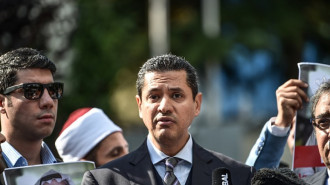Breadcrumb
Bahrain king 'bans mixing religion and politics'
A law to ban the mixing of religion and politics in Bahrain was passed by King Hamad bin Isa al-Khalifa on Saturday, just two weeks after a court doubled the jail sentence handed to prominent opposition leader and Shia Muslim cleric Sheikh Ali Salman.
The act comes as part of an amendment to a 2005 law regulating political societies. In 2011, the country's Shia Muslim majority led protests inspired by the Arap Spring demanding democratic reforms from the Sunni-led monarchy.
The new amendments prohibit those in active religious positions from engaging in political activities.
Under the latest amendments "simultaneous membership in a political society and engagement in religious preaching, guidance or speeches," will be prohibited, according to Bahrain News Agency.
"Under no circumstances can anyone combine religious preaching and membership in a political society," it reported Sunday.
Those in support of the motion argue that the decision will make sure religious acts are not politicised and political motives are not given religious reasoning.
But the act may provide further incentive for the detention of opposition figures who seek regime change.
 |
Those in support of the motion argue that the decision will make sure religious acts are not politicised and political motives are not given religious reasoning |  |
Authorities detained Shia cleric and leader of Bahrain's main opposition group Sheikh Ali Salman in July 2015 over charges of inciting violence and seeking to change the political system.
The detention of the 50-year-old drew outright condemnation from rights groups as well as the US and Iran.
The tiny but strategic Gulf state has been shaken by unrest since it crushed a month-long, Shia-led uprising demanding reforms in 2011.
Despite the 2011 crackdown, protesters still frequently clash with police in Shia villages outside the capital Manama.
Five years after the revolt, Bahrain is locked in a political impasse.
After the Arab Spring touched the small Gulf state on 14 February 2011, Bahrain's Shias demanded a more representative government and a constitutional monarchy.
Scores have died in periodic unrest despite the suppression of the original uprising, and efforts at dialogue have failed.
The government denies discriminating against Shias and regularly accuses Iran, 200 kilometres [125 miles] across the Gulf, of meddling in Bahrain's internal affairs.
Manama also frequently announces the dismantling of "terrorist" cells it says are linked to Iran, a charge the region's main Shia power denies.
Agencies contributed to this report.






![Anthony Blinken speech [Getty] Anthony Blinken speech [Getty]](/sites/default/files/styles/image_684x385/public/media/images/6263436E-8ACD-4D3C-9055-25A7BE79DD5A.jpg?h=d1cb525d&itok=fLHmHCRG)
 Follow the Middle East's top stories in English at The New Arab on Google News
Follow the Middle East's top stories in English at The New Arab on Google News


![MSF halts operations on one of Sudan's last functioning hospitals [Getty]](/sites/default/files/styles/image_330x185/public/2177142919.jpeg?h=a5f2f23a&itok=vnjc3phC)